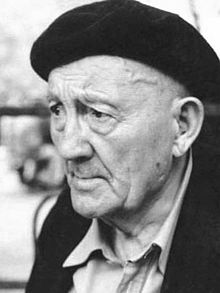Petre Țuțea
| Petre Țuțea | |
|---|---|
 |
|
| Born |
6 October 1902 Boteni |
| Died | 3 December 1991 (aged 89) Bucharest |
| Pen name | Petre Boteanu |
| Occupation | philosopher, economist, essayist, journalist |
| Nationality | Romanian |
Petre Țuțea (Romanian: [ˈpetre ˈt͡sut͡se̯a]; 6 October 1902 – 3 December 1991) was a Romanian philosopher, journalist and economist.
Petre Țuțea was born in the village of Boteni, Muscel region (now in Argeş County). His father, Petre Bădescu, was a Romanian Orthodox priest and his mother, Ana Țuțea, was of peasant stock. After the First World War, Țuțea left his village to finish high school in Cluj and went on to study law at the University of Cluj. After graduating, he obtained a PhD in Administrative Law, also at the University of Cluj.
Petre Țuțea moved to Bucharest and in 1932 he founded, together with Petre Pandrea, a leftist newspaper, "Stânga" ("The Left"), that was quickly and forcefully closed by the government. According to an anecdote told by Emil Cioran, Țuțea once went to a newspaper stands and bought the Soviet newspaper Pravda despite not being able to read Russian, then kissed it, showing his appreciation for Marxist ideology. Nevertheless, later in life, he would change his political views, departing from the Marxism and later became a devout Orthodox Christian.
In 1935 Țuțea and four other writers published a nationalist program of economic and social development, "Manifestul revoluției naționale" ("Manifesto for a National Revolution"). Around the same time he met the influential philosopher Nae Ionescu and wrote for his famous newspaper "Cuvântul" along with Mircea Eliade, Emil Cioran, Radu Gyr, Mircea Vulcănescu, Mihail Sebastian and other known writers.
Țuțea was a member of the Criterion literary society and, like many other fellow members, became a sympathizer of the Iron Guard, a right-wing, ultra-nationalist organization. According to various published interviews, at that time Țuțea reckoned that democracy would have not guaranteed the sovereignty of the Romanian people. He also noted that many Romanian intellectuals had supported the Legionnaires, because "their radical position against the harmful influence of Russian Bolshevism", which he considered to be "controlled by Jews" (see Judeo-Bolshevism). Speaking of the Iron Guard, he notes the main difference between this organization and Fascism or National Socialism was its avowed Christian character.
...
Wikipedia
